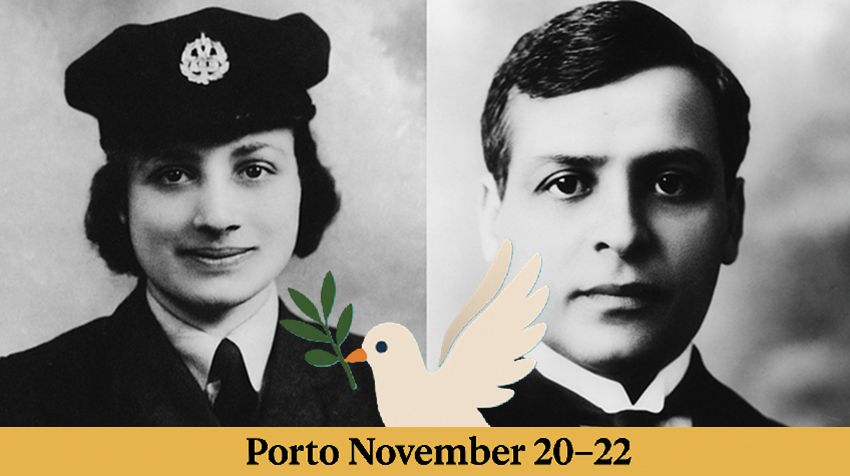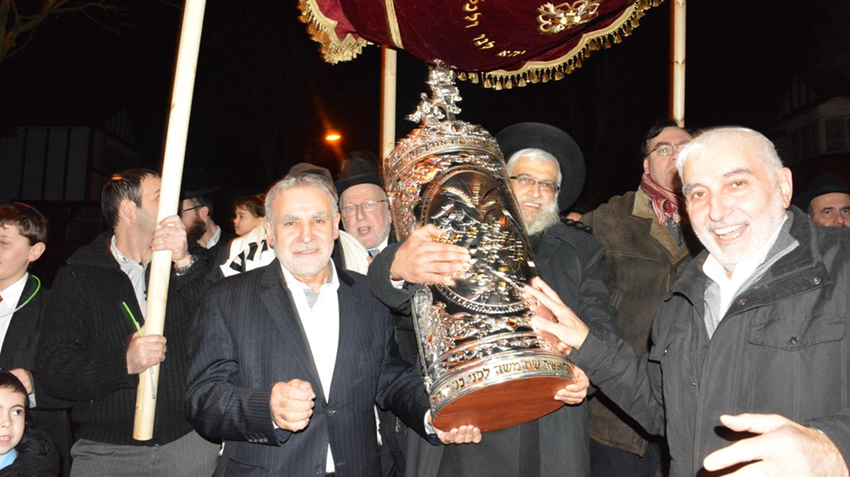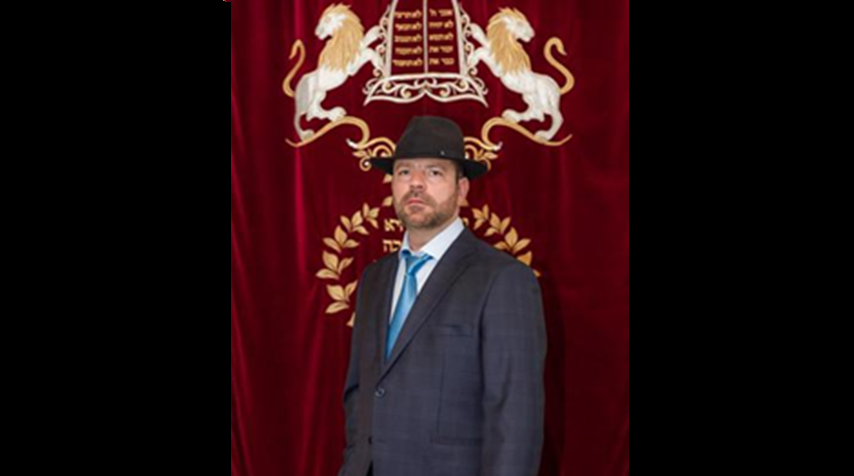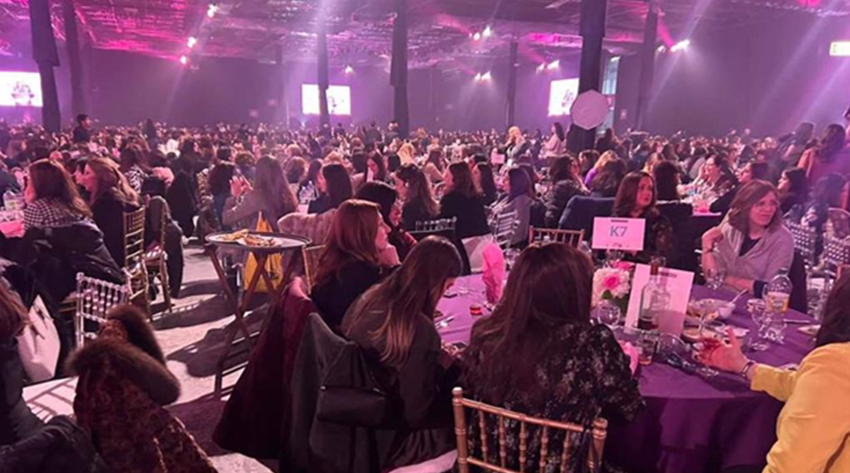On November 20 and 22, Oporto will host a remarkable cultural event: the Taybelekh concert, dedicated to the klezmer musical genre, and the The Righteous exhibition, which pays tribute to Christians and Muslims who risked their lives to save Jews during the Second World War.
Tickets cost €10 and must be purchased online in advance for the sessions on Thursday, November 20, and Saturday, November 22, at 7:15 PM: https://www.tickettailor.com/events/taybelekh
The PJN spoke with David Hayes, the promoter of the events, who shared his personal connection to klezmer music and his motivation for organising this initiative, whose entire proceeds will be donated to the Holocaust Museum of Oporto.
To begin, could you briefly introduce yourself and tell us who David Hayes is?
DH: I grew up in post war London, living with my parents, grandmother and other two daughters in a flat in North West London. My parents had been bombed out twice. My mother, was Sephardi (nee Israel) and my father Ashkenazi. But my dominant influence was Sephardim with a strong family memory of living in Belem, Para and my great grandfather a rubber merchant founding the beautiful synagogue in Belem. But another contradiction was that we attended an Askenazi synagogue, After I returned from 6 months on a Ulpan in Israel, I was very involved in organising social activities for a Zionist society. for a couple of years before I went to university to take an electronics degree.
What is your personal connection to klezmer music and dance?
DH: My first interest in Jewish actually began by my listening to Andalusian music from Morocco, including singers who I latter discovered were often Jews. My Israel family had spent maybe 300 hundred years living in exile in North Morocco, so who knows why I loved the music. My interest in Klezmer, began by accident. As a co-organiser of the first Sheffield Anne Frank in World exhibition I was given £500 to buy a collection of "Jewish Music" about which I knew nothing! So, I ended up buying cantorial songs plus Yiddish songs and the new releases from New York of Klezmer dance music. Thereafter, with some brilliant music teachers, we organised the first Klezmer Festivals in Leeds and Sheffield... I also rang a Klezmer listings website for 10 years.
How did the idea of bringing the exhibition “The Righteous” together with a klezmer music performance to Oporto come about?
DH: Thanks to the work of a cousin who retraced our family tree back from Para, via Gibraltar and Ceuta, I was able to obtain my Portuguese citizenship with the help of the Belem and then the Porto synagogues. I wanted to reclaim my birthright. I made my first visit to Porto last November, and I was bowled over by the Kadoorie Synagogue, the Jewish museum. But especially when my family and I were invited to the Kristalnacht anniversary event at the Holocaust Museum. Because I think that the outreach work is so important that I had the "simple" idea of holding a benefit concert and also The Righteous Exhibition.
Has this event been presented in other countries before? How has the public responded to it?
DH: The Taybelekh musicians have been specially organised for Porto, with such a dedicated enthusiastic group of people who understand it is an experiment to bring the music here. It is also hoped that a Portuguese version of The Righteous will useful for further outreach work that others will take forward. So please come along to the concerts and enjoy yourselves!
The Taybelekh concert features several internationally renowned musicians. Could you tell us a bit about them?
DH: Ilana Cravitz is a London based violinist and educator and founder of the London Klezmer Quartet. She has toured Australia, several times and performed in Brazil plus several European countries. Phil Tomlinson, organiser of Kleznorth has played in Western Europe and more recently led Yiddish singing workshops in Warsaw, which is surely a fantastic honor.
Could you explain the concept behind the exhibition “The Righteous” and how it was created?
DH: Several years ago, I was organising a Holocaust Memorial Day event Mir Zaynen Do! A special programme, curated by Phil Tomlinson, of Yiddish songs and readings mostly created by musicians and poets prior to the liquidation of the Nazi organised ghettos. I found this unique programme so inspiring that I wanted audience participation from Sheffield's diverse ethnic communities, who previously had usually ignored Civic Holocaust vigils. So, the Exhibition was created - it succeeded and was subsequently extended. The Mir Zaynen Do! programme and Exhibtion has been staged in several UK cities, and recognised by the City of Sheffield for its contribution to community cohesion.
Why did you decide to donate the proceeds from the event to the Holocaust Museum of Porto?
DH: Well, it seemed to me - a no brainer! Just to make a modest contribution in recognition of the Museum and its wonderful Curator Hugo Vaz.
You have visited the Jewish community of Porto several times. What impressions and memories do you have from those visits?
DH: I have now visited three times and each time I found it a better experience. As a child, I was used to attending a large synagogue in London. As a very shy child, I found that difficult. For years now I have lived in a city where our shuls are relatively small and we all more or less are friends with each other. So, visiting Kadoorie with its large membership and I suppose many casual visitors, is more challenging. But I especially enjoyed by last visit when I attended some of the Succot services and begin to make friends with some of the members.
What inspires you to continue promoting initiatives that preserve memory and celebrate Jewish culture?
DH: A difficult question. For me Judaism, is not a religion, but a totality of living life in all of its dimensions. I only wish I could have the energy and resources to introduce the Sephardi/Mizrachi music appearing now in London, to the North of England.


































